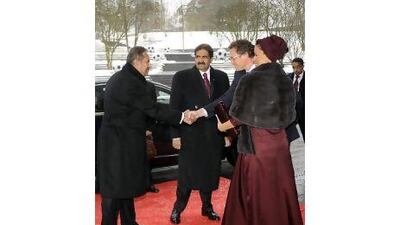ZURICH // As Qatar and the rest of the 2022 World Cup bidding nations made their final presentations last night, a last day of frantic canvassing was under way for the 2018 candidates.
With Vladimir Putin, the Russian prime minister, opting out of helping his country's bid, it was left to other leaders, princes and football greats to attempt to sway voters.
Qatar, Australia, Japan, South Korea and the United States all made final 30-minute presentations to the 22 members of Fifa's executive committee. They must now wait until at least 7pm today to find out if their 2022 bid has been successful.
Meanwhile, Russia, England, Spain/Portugal and Belgium/Netherlands, vying for the 2018 World Cup, make their presentations this afternoon.
Putin chose not fly to Zurich, saying he did not want to be involved in "unfair competition". He said there has been a campaign to smear the members of the Fifa executive committee.
It is a move thought to have damaged Russia's position as favourites, though it could still count on Roman Abramovich, Chelsea's billionaire owner, Andrei Arshavin, the Arsenal forward, and Anna Netrebko, the opera diva.
In the build-up to the vote, a British newspaper sting led to the expulsion of two Fifa executive committee members and a BBC documentary accused others of taking secret payments from the organisation's former marketing partner.
Cristiano Ronaldo, the Real Madrid star, was not able to help with the Spain/Portugal presentation either, because of an ankle injury, but they had Eusebio, the Portugal legend, in Zurich.
England's bid was bolstered by David Cameron, the prime minister, Prince William and David Beckham.
Beckham, who helped in London's successful bid for the 2012 Olympics, said: "The last 24 hours can be the most important without a doubt. I think the momentum is out there now, people have focused on the negative and we now are focused on the positive."
Key questions about how the voting works
Football fans around the globe will learn today where the 2018 and 2022 World Cups will be held
Who is bidding?
There are four bids for the 2018 World Cup and five for the 2022 tournament - nine bids in all representing a total of 11 countries.
2018: England, Netherlands/Belgium (joint bid), Russia, Spain/Portugal (joint bid)
2022: Australia, Japan, Qatar, South Korea, United States.
What is at stake?
At stake is the right to stage the next two available football World Cup tournaments, month-long extravaganzas that make the host nations the centre of the world's attention, while attracting television audiences measured in billions. The successful bidders for 2018 will follow Brazil, who will stage the competition in 2014, and South Africa, this year's host.
How many people are voting?
Voting rights are held by the Fifa executive committee, which had numbered 24 but is down to 22 after two members - Reynald Temarii of Tahiti and Amos Adamu of Nigeria - were suspended following an investigation into reports that they offered to sell their votes to undercover reporters from The Sunday Times newspaper. The Oceania Football Confederation had hoped that their acting president, David Chung of Papua New Guinea, would be able to vote in place of the suspended Temarii but those hopes were dashed on Tuesday night when Temarii decided to launch an appeal.
Who are these people?
The 22 members with a vote are: Sepp Blatter (Switzerland), Julio Grondona (Argentina), Issa Hayatou (Cameroon), Chung Mong-joon (South Korea), Jack Warner (Trinidad and Tobago), Angel Maria Villar (Spain), Michel Platini (France), Geoff Thompson (England), Michel D'Hooghe (Belgium), Ricardo Teixeira (Brazil), Mohamed bin Hammam (Qatar), Senes Erzik (Turkey), Chuck Blazer (United States), Worawi Makudi (Thailand), Nicolas Leoz (Paraguay), Junji Ogura (Japan), Marios Lefkaritis (Cyprus), Jacques Anouma (Ivory Coast), Franz Beckenbauer (Germany), Rafael Salguero (Guatemala), Hany Abo Rida (Egypt), Vitaly Mutko (Russia).
How do the voters decide?
Fifa produced lengthy technical reports on the bids and the candidates will each get to make a presentation to the voting Fifa members. While that carries some weight, people in the know say more important are the personal chats between bid representatives and the powerful members of the executive committee.
How does the voting work?
Before the voting, the candidates will make their final presentations, lasting 30 minutes. They began yesterday, with the 2022 bidding nations, and conclude today. The executive committee will hold a closed meeting at 6pm at Fifa HQ and then start the voting process. The 2018 vote will take place first followed by 2022, with the winners due to be announced at 7pm. The winner will be the bid which obtains 50-per cent-plus-one of the votes of the executive committee members present. If no bid achieves an absolute majority, the bidders with the lowest number of votes will be eliminated and a new round of voting will begin.
What if there is a tie?
If the voting comes down to the last two bids and there is a tie, Blatter, the Fifa president, will have the casting vote.
How will we find out who has won?
The votes will be taken in secret and the results will not be announced after each round, meaning there will be no clues as to how the voting has gone before Blatter opens the envelopes at the decision ceremony at the Messezentrum Zurich.

